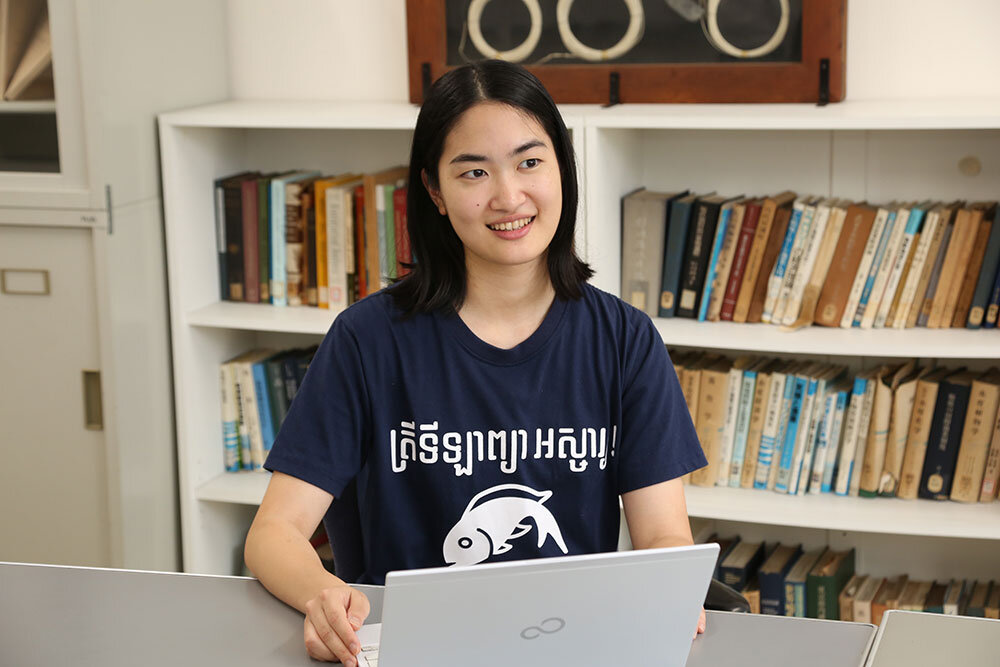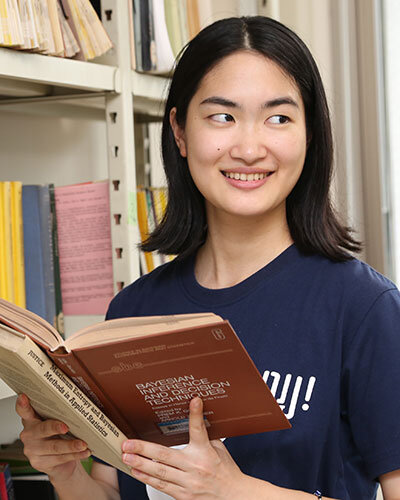INTRODUCTION学生紹介
- HOME
- support
- Student Introduction
- NAGATSUKA MITSUKI
STUDENT INTRODUCTION
Marine Policy and Management
NAGATSUKA MITSUKI
Specializations:Marine Management
Main academic advisor:KITAKADO, Toshihide
Mentor:SEKIGUCHI, Yoshiyuki / YOKOTA, Masashi

Controlling fish catches to prevent depletion amid growing population and seafood demand; aspiring to work abroad in the future
Determining the appropriate fishing quota: Explaining through simulations using statistical models
My research topic is ananalysis of freshwater fish resources in Tonlé Sap Lake in Cambodia. Based on the environmental factors that affect the catchability, I am dealing with determining the status of fish resources in the lake by fitting the appropriate statistical model to the data. I have been conducting this research for each species separately with simple numbers of parameters when in undergraduate, and from now on in graduate school, I am willing to develop further by including many species in the lake together in order to achieve ecosystem modeling.
I have chosen to go with this research topic because of an internship I have experienced at a fish farm in Cambodia during my undergraduate days. Unlike Japan, where saltwater fish are mainly consumed, I found it interesting that Cambodia has abundant freshwater fish resources in rivers and lakes. Additionally, by coincidence, my professor provided me with data on Tonlé Sap Lake, which had led me to analyze fish in Tonlé Sap Lake.
Southeast Asia has a growing population and the economic growth is also rapidly changing, thus the demand for seafood is increasing. However, overfishing which leads to resource depletion is becoming a serious issue in terms of food security. With this fact aside, as a goal of my research, I want to demonstrate the appropriate fishing quota using statistical models, not based on intuition. The research will likely involve establishing rules and regulations, such as indicating what amount constitutes overfishing and specifying the maximum tonnage that can be harvested. Having rules in place will allow fishermen to secure stable incomes and provide a stable supply of seafood. I believe that this research will be contributing to create such an environment.
In this research, I use my brain fully to use statistical models for prediction of the status of fish resources for logical explanation. That's what makes it interesting.
Application for the WISE program motivated by a senior advise
 I applied for this WISE program after I found it interesting about studying deeply about artificial intelligence that has attracted intense attention worldwide.
I applied for this WISE program after I found it interesting about studying deeply about artificial intelligence that has attracted intense attention worldwide.
On the other hand, I had concerns about the lack of my skills in this field. I couldn't even define AI myself and wondered, "What exactly is AI?" While I believed that the things I would learn in the WISE Program could be helpful in my research, I was worried about whether I can deal with the program. So, I consulted with the senior student who is also in the WISE program, who advised me that what I would learn in the WISE Program is an extension of my current research, and if I can construct programs myself, it should be fine. That's what encouraged me to make the decision to join the WISE Program.
Although I had some experience of coding programs before, everything that I learn in the lectures is new to me. It can get difficult to digest everything the moment I learn, but it's fun and interesting after understanding the concept. The lectures in the WISE Program are enjoyable, of course, and in graduate school, I can focus on learning your specialty, so it's an entirely different kind of enjoyment compared to my undergraduate years.
There are overlaps between my research and the classes in the WISE Program, so I am conducting research and studying simultaneously. The content I'm learning in the WISE Program is something I should know for my future research anyway. I spend about five hours a day studying for the WISE Program while also working on my research.
Getting motivated to study more
One of the advantages of joining the WISE program is that you will have a good atmosphere where you can concentrate your study. Artificial intelligence is now widely used in many daily services by which we as consumers receive great benefits.
However, it is often complicated to understand in what process AI is giving you the convenience and therefore I believe leaning AI can be the indicator to decision making in future. I couldn't make a step for this field before participating in this WISE program as I needed time to deeply understand AI from scratch to further application.
Now after joining the WISE program, I can spend enough time on AI and can also ask related questions anytime to someone in the program, and this is motivating me to study more.
Continue the research with refreshing time
I shift my commute time to avoid rush hour. I also find it easier to concentrate at night, so I prefer to start my research in the afternoon. After waking up in the morning, I exercise to start my day and head to campus around noon and sometimes study till night time. I often read books in the train, which is less crowded. Conversations with people are also a way to refresh myself. Stepping away from my research is sometimes needed for the research in the long term .
In the future, I want to work abroad, with the knowledge I've gained and I will be gaining from the WISE Program and university. I don't know if all the programming and fisheries knowledge I'm currently learning will directly apply to my job, but I hope to use what I've learned somehow.

